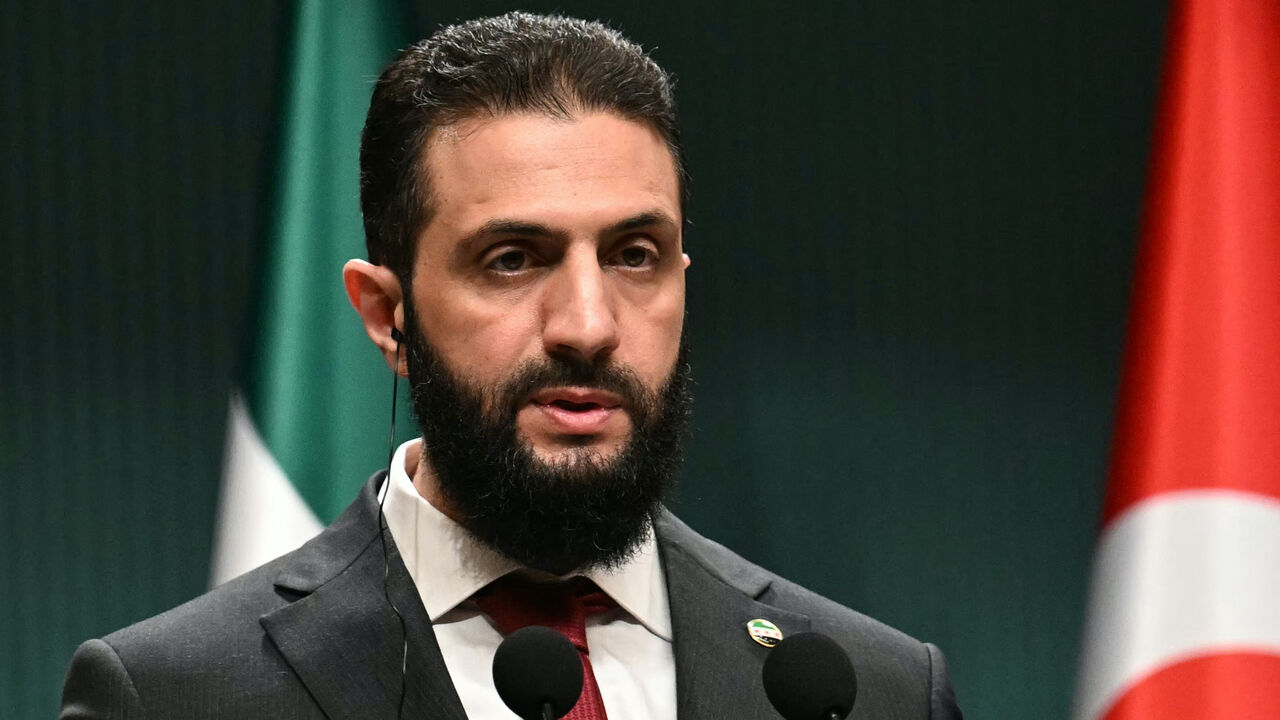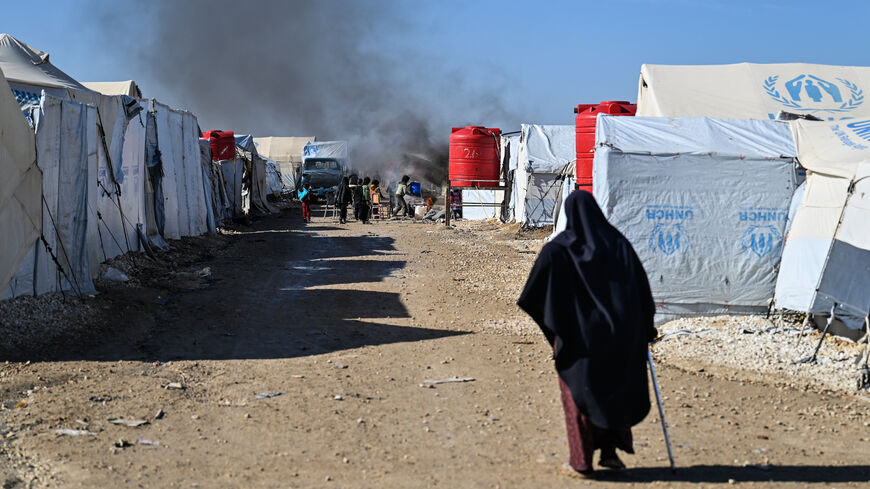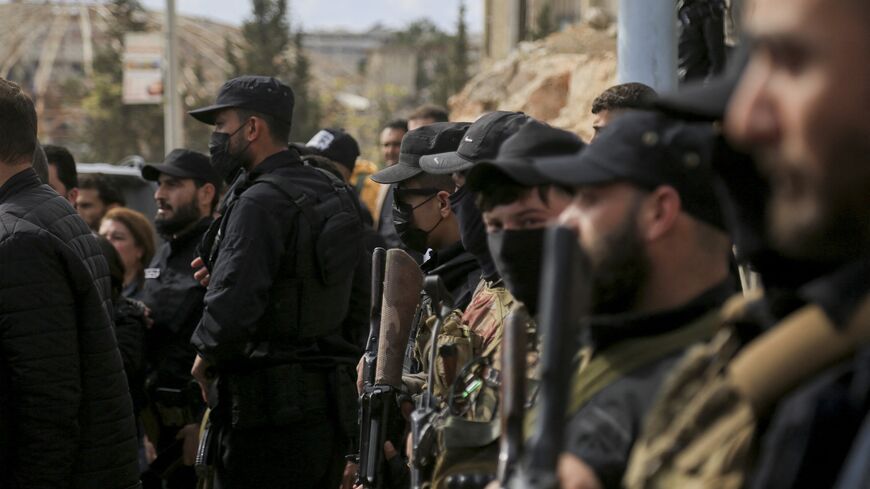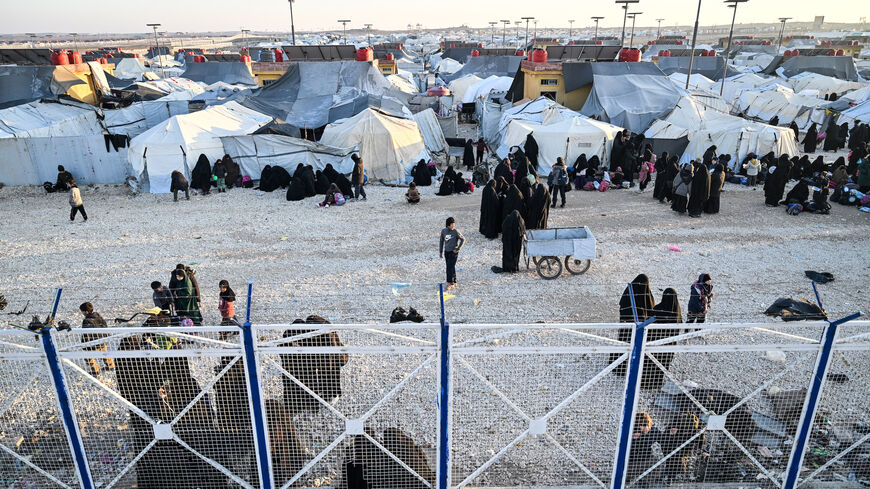Syria’s Sharaa to sign deal at White House to join anti-ISIS coalition
US special envoy to Syria Tom Barrack said the Syrian president will formalize his country’s entry into the US-led alliance next week.

MANAMA — Tom Barrack, the US special envoy to Syria and ambassador to Turkey, told reporters on the sidelines of the Manama Dialogue Conference in Bahrain today that Syrian President Ahmed al-Sharaa is expected to sign a document in Washington on Nov. 10 with President Donald Trump for Syria to join the US-led coalition against the Islamic State. The meeting will mark the first time a Syrian head of state has ever been received at the White House. It will also showcase the extraordinary conversion of Sharaa from a committed jihadi seeking to kill American soldiers in Iraq to a smooth-talking statesman who is wooing leaders across the globe.
Barrack told a gaggle of reporters after leaving the stage at the conference that the Syrian president would be joining 88 other countries that are partners in the alliance launched in 2014 as ISIS swept across Syria and Iraq and established its murderous “caliphate.”
“We are trying to get everybody to be a partner in this alliance, which is huge for them,” Barrack said.
The jihadis’ quasi-state was finally crushed in 2019 by coalition forces together with their top allies on the ground, the Kurdish-led Syrian Democratic Forces (SDF). However, ISIS cells that have regrouped across Syria continue to pose a threat as Sharaa seeks to establish control over his war-ravaged country after ousting Syria’s longtime dictator Bashar al-Assad last December.
Barrack was a featured speaker at the conference, organized by the International Institute for Strategic Studies and attended by top regional and Western officials, including foreign ministers and spymasters. Tulsi Gabbard, the US Director of National Intelligence, was among those present.
For Sharaa, joining the US-led coalition against ISIS is in many ways a formality. Sharaa has been discreetly cooperating for almost a decade with the United States against the jihadis, sharing intelligence on the whereabouts of key ISIS and al-Qaeda leaders in and around the northern region of Idlib. Sharaa and Hayat Tahrir al-Sham, one of the toughest radical Islamist outfits in Syria — designated until recently by Western governments, including the United States, as terrorists — governed Idlib before taking over Damascus.
Sharaa’s fight against ISIS was rooted as much in his effort to exert full dominance over Idlib as in his desire to win Western trust. Before renouncing his ties with global jihad in 2016, Sharaa went through a series of jihadi iterations. Today, ISIS denounces Sharaa as an apostate and has declared him a target as it seeks to reconstitute itself.
“In many ways, Sharaa meeting Trump to officially join the global coalition against ISIS is the culmination of years of changes we’ve seen from Sharaa and his group previously,” said Aaron Zelin, an expert on violent extremism at the Washington Institute for Near East Policy. “But of course they’ve been actively fighting against ISIS since 2013 in the battlefield,” Zelin noted. Between 2017 and the present, Sharaa and his men have conducted 75 counterterrorism operations against ISIS. Since the fall of the regime, the United States has been feeding intelligence to Damascus and, as of today, there have been eight joint operations between US Central Command and the Syrian government to break up ISIS cells in government-controlled areas, Zelin added.
ISIS resurgence fears
Fourteen years of civil conflict have left Syria in ruins. The World Bank said last week that rebuilding the country will cost an estimated $216 billion. Congressional sanctions adopted under the 2020 Caesar Syria Civilian Protection Act — named after an Assad regime defector who exposed its crimes — continue to deter foreign companies, including wealthy Gulf nations eager to help, from investing in Syria for fear of being caught in the sanctions net. The longer the government is unable to deliver on promises to relieve grinding poverty and establish stability, the greater the risk of an ISIS resurgence.
Adding to the risk is the presence of thousands of restive foreign fighters and their families in prisons and detainee camps in the Kurdish-led northeast of the country, including the infamous Al-Hol camp, which a senior regional official described on Thursday as a “ticking time bomb.” The US-led coalition has asked the United Nations to take over management of the Al-Hol camp.
As Elizabeth Hagedorn reported, the Trump administration is pushing hard for Congress to scrap its remaining sanctions. Barrack is among those leading the effort. The envoy said he hoped that the anticipated accord on combating ISIS, along with progress in a deconfliction agreement between Israel and Syria and between Syria and the SDF to integrate the Kurdish-led third of the country, would help persuade Congress to fully rescind the Caesar sanctions. “All of these things are additive,” Barrack said.
The envoy expressed optimism that an amendment calling for an unconditional repeal — introduced by a group of bipartisan senators to the National Defense Authorization Act (NDAA), which specifies the annual budget and expenditures of the Pentagon — would survive and be approved by the House.
“Our hope is that it’s in the NDAA, which is the last part of the agreement that will be done in December, and we are working to show them all of those pieces. Syria is doing a very good job in trying to get there,” Barrack said.
Najib Ghadbian, director of the Center for Strategic Studies at the Syrian Foreign Ministry, who briefed a small group of reporters on Saturday, said that one of the reasons Syria had not joined the anti-ISIS coalition earlier was unresolved issues over command structures involving the SDF’s role. Damascus believes the SDF should be under its command, part of a broader standoff between the Kurdish-led armed forces and the central government over how integration should take place.
Barrack told the conference that those talks were going “amazingly well,” without elaborating.
Ghadbian said his government realized that “you can’t move ahead without fixing that part of the country,” and warned that if a deal were not reached, simmering tensions between Damascus and the Kurds could escalate.
Meanwhile, “a lot of progress” has been achieved in security arrangements based on the 1974 armistice agreement with Israel. “There is an expectation and willingness on our side to sign a deal that would allow President Trump to declare another victory,” Ghadbian said. The aim is to get Israel to withdraw to the positions it held prior to Dec. 8.
Israeli forces crossed the 1974 ceasefire lines after the Assad regime fell, entering the UN-established buffer zone in Quneitra and establishing positions on Mount Hermon. They have since conducted intermittent airstrikes on Syrian military targets in moves they say are aimed at securing the Jewish state against potential attacks by Assad regime remnants and their Iran-backed allies.
A major escalation occurred in July when Israeli forces struck Syrian troops in the governorate of Suwayda to protect the area’s majority Druze population. The Israeli intervention — which extended to Damascus, where it struck the Defense Ministry headquarters — came after Bedouin tribes and government forces clashed with the Druze. More than a thousand people, mainly Druze civilians, died in the violence rights groups and war monitors say.






